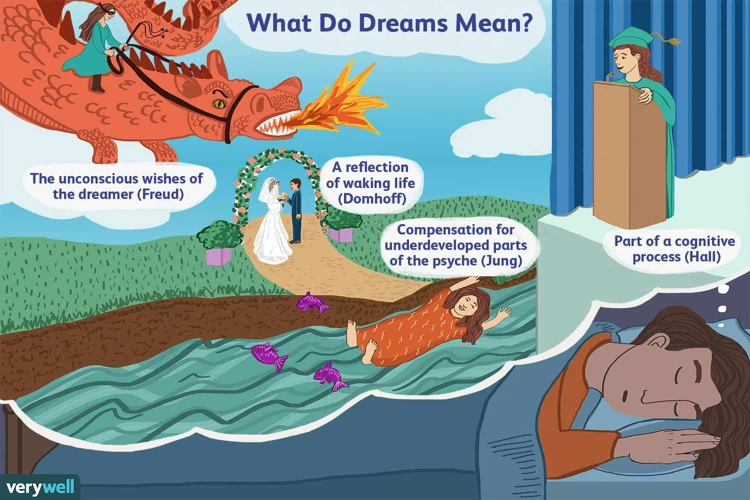Unlocking the Hidden Significance: Dreams About Childhood Home Explained
Dreams have always been a source of fascination and intrigue, their meaning often elusive and shrouded in mystery. Among the many types of dreams, those revolving around our childhood homes hold a special place of significance. These dreams can offer a deeper understanding of our subconscious thoughts and emotions, as well as provide a glimpse into our past and present selves. In this article, we will delve into the hidden symbolism behind dreams about our childhood homes, explore various elements that can be interpreted within these dreams, and provide tips for unlocking their true meaning. Prepare to embark on a journey of self-discovery as we unravel the mysteries of these captivating dreams.
The Significance of Childhood Home in Dreams

Dreams about our childhood homes hold deep significance and can provide valuable insights into our subconscious mind. These dreams often symbolize a sense of security, comfort, and familiarity that we associate with our early years. Our childhood homes are the foundation of our upbringing, and dreaming about them can reflect our longing for emotional stability and a connection to our past. These dreams may also serve as a reminder of our early memories and nostalgia for simpler times. Exploring the hidden meaning behind dreams about our childhood homes can help uncover unresolved emotions, gain self-awareness, and provide a path towards personal growth and healing. To understand the true significance of these dreams, we must delve into the various symbols and elements that manifest within them.
1. Symbolism of Security and Comfort
1. Symbolism of Security and Comfort
Dreams about our childhood homes often symbolize a deep desire for security and comfort. Our childhood homes represent a time in our lives when we felt safe and protected. The familiar surroundings, the warmth of family, and the sense of belonging create a strong emotional attachment to these spaces. In our dreams, the childhood home serves as a symbol of stability and offers a refuge from the uncertainties and challenges of adulthood. It is a place where we can retreat to find solace and reassurance. These dreams may arise when we are facing periods of change or experiencing heightened stress, reminding us of the need for a strong foundation and a sense of security. Exploring the symbolism of security and comfort in dreams about childhood homes can help us understand our deep-rooted emotional needs and provide insight into the areas of life where we seek stability and protection.
[To learn more about the significance of childhood homes in dreams, click here.](/dreaming-of-childhood-home/)
2. Reflection of Childhood Memories and Nostalgia
Dreams about our childhood homes serve as a powerful reflection of our past memories and evoke a deep sense of nostalgia. These dreams can transport us back to a time of innocence and joy, reminding us of the experiences and emotions we felt as children. The familiar sights, sounds, and smells of our childhood homes can be vividly recreated in these dreams, triggering a flood of memories and emotions. Whether it’s the creaking staircase, the smell of freshly baked cookies in the kitchen, or the laughter of siblings playing in the backyard, these dreams allow us to relive cherished moments from our past. Exploring the significance of these nostalgic dreams can help us reconnect with our inner child and gain a better understanding of our present selves.
3. Representation of Inner Child and Self-Identity
Dreams about our childhood homes also serve as a representation of our inner child and self-identity. Our childhood homes are a reflection of the environment in which we grew up, shaping our sense of self and shaping our early experiences. When we dream about our childhood homes, it can symbolize a desire to reconnect with our inner child or explore aspects of our identity that were formed during that time. These dreams may inspire us to rediscover forgotten passions, confront unresolved childhood issues, or rediscover a sense of innocence and wonder. Exploring the link between our childhood homes and our self-identity can help us understand the impact of our upbringing on our present lives and allow us to nurture and heal our inner child.
Interpreting Different Elements of Childhood Home Dreams

Interpreting Different Elements of Childhood Home Dreams
1. Architecture and Layout: The architecture and layout of your childhood home in a dream can hold significant meaning. Pay attention to details such as the size, shape, and condition of the house. A well-maintained and secure home may indicate feelings of stability and contentment, while a dilapidated or crumbling house could symbolize unresolved issues or a sense of instability. Dreaming of childhood home with unique features like secret compartments or hidden rooms may represent undiscovered aspects of yourself or the presence of hidden emotions.
2. Colors and Décor: The colors and décor of your childhood home in a dream can also convey important messages. Bright and vibrant colors may signify positivity and happiness, while dull or faded colors might suggest feelings of sadness or nostalgia. Take note of the furniture, decorations, and personal items within the dream as they can offer insights into your past experiences and emotional attachments.
3. People and Interactions: The presence of specific people in your childhood home dreams can provide valuable clues about your relationships and emotions. Are there family members present? Childhood friends? High school classmates? Pay attention to the interactions and dynamics between these individuals. These encounters can reflect unresolved issues, cherished memories, or the desire for reconnection with people from your past.
By analyzing and interpreting these different elements within your childhood home dreams, you can gain a deeper understanding of your subconscious mind and uncover hidden emotions or experiences that may impact your waking life.
1. Architecture and Layout
The architecture and layout of our childhood home in dreams play a crucial role in deciphering their hidden meanings. The size, shape, and overall condition of the house can reflect our perception of stability and security. A well-maintained home may signify a sense of comfort and emotional well-being, while a dilapidated or chaotic house could represent feelings of instability or unresolved issues. The different rooms and spaces within the house can also hold symbolic value. For example, a dream about a basement might indicate buried emotions or unresolved past experiences. Exploring the architecture and layout of our childhood home dreams can offer valuable insights into our inner thoughts and emotions, helping us to better understand ourselves and navigate our waking lives. To learn more about the significance of dreaming about your childhood home, visit our article here.
2. Colors and Décor
Colors and décor within dreams about our childhood homes play a crucial role in understanding their deeper meaning. The choice of colors can evoke certain emotions and feelings. Vibrant and lively colors may represent happy and joyful memories, while muted or dull colors might indicate a sense of sadness or nostalgia. Paying attention to the décor can also provide valuable insights. For example, a well-maintained and pristine interior might symbolize a sense of stability and contentment in one’s life. On the other hand, a cluttered or dilapidated environment could signify unresolved issues or a need for change. By analyzing the colors and décor within our childhood home dreams, we can gain a better understanding of our emotions, desires, and conflicts from the past and present.
3. People and Interactions
When interpreting dreams about our childhood homes, paying attention to the people and interactions within the dream is crucial. The individuals present in these dreams often hold symbolic meaning and can represent different aspects of ourselves or significant figures from our past. Family members, friends, or even strangers encountered in these dreams may represent various emotions, relationships, or unresolved issues we have with these individuals. For example, seeing a deceased loved one could indicate a desire for their guidance or a need to address unresolved grief. Examining the interactions and dynamics between these individuals can provide insights into our current relationships and the dynamics we experienced in our childhood. Taking note of the emotions and reactions we have towards these characters in our childhood home dreams can offer valuable clues to our inner thoughts and feelings.
Common Scenarios in Childhood Home Dreams

Common Scenarios in Childhood Home Dreams
1. Exploring Familiar Rooms and Spaces: In these dreams, you may find yourself wandering through the rooms of your childhood home, revisiting familiar spaces filled with memories. Each room may hold specific emotions or experiences tied to it, providing insight into different aspects of your past.
2. Finding Secret Passages and Hidden Rooms: Dreams about discovering secret passages or hidden rooms in your childhood home can symbolize the exploration of your own hidden emotions or aspects of your personality. These dreams often represent a desire to uncover hidden truths or potential within yourself.
3. Discovering Changes or Abandonment: Dreams about changes or abandonment of your childhood home can signify feelings of loss, change, or transition in your waking life. These dreams may express a fear of losing connections or a sense of nostalgia for a time that has passed.
These common scenarios in childhood home dreams can offer clues about your inner thoughts, emotions, and desires. By paying attention to the details and emotions experienced in these dreams, you can gain a deeper understanding of yourself and your personal journey.
1. Exploring Familiar Rooms and Spaces
When we dream about our childhood home, one common scenario is exploring familiar rooms and spaces. In these dreams, we may find ourselves wandering through the living room, kitchen, or bedrooms that hold significant memories from our past. Each room can hold its own symbolism and meaning. For example, the bedroom may represent aspects of our private life and personal identity, while the kitchen may symbolize nourishment and nurturing. Exploring these familiar rooms can provide insight into our inner desires, emotions, and unresolved issues. It allows us to revisit and confront past experiences, reflecting on how they have shaped us into who we are today. These dreams serve as a reminder to pay attention to the details and emotions associated with each room, as they hold essential clues to understanding our present selves.
2. Finding Secret Passages and Hidden Rooms
2. Finding Secret Passages and Hidden Rooms
In dreams, the discovery of secret passages and hidden rooms within our childhood homes can hold significant symbolism. These hidden spaces represent unexplored aspects of ourselves that are waiting to be discovered and understood. They may indicate hidden talents, suppressed emotions, or forgotten memories that are resurfacing. Finding secret passages can also symbolize a desire for adventure, exploration, or a yearning for something beyond what is visible in our everyday lives. These dreams encourage us to embrace curiosity and delve deeper into our subconscious to uncover hidden truths and aspects of our personality. The hidden rooms and secret passages can act as gateways to self-discovery and serve as reminders that there is always more to explore within ourselves and our past.
3. Discovering Changes or Abandonment
Discovering changes or abandonment within our childhood home dreams can evoke strong emotions and symbolize significant life transitions. When we dream of our childhood home being altered or abandoned, it may reflect changes or upheavals in our own lives. These dreams could indicate feelings of loss, fear of change, or a need to let go of the past. The changes within the house could represent personal growth, while abandonment may suggest feelings of abandonment or neglect. Exploring the details and emotions surrounding these dreams can provide valuable insights into our own adaptability, resilience, and ability to navigate life’s transformations.
Psychological and Emotional Analysis

Psychological and Emotional Analysis
The psychological and emotional analysis of dreams about our childhood homes offers valuable insights into our fears, desires, and yearnings. These dreams often elicit a sense of fear and insecurity, representing the anxieties we may carry from our past. They can also serve as an manifestation of longing for the past, a nostalgia for the innocence and simplicity of childhood. Additionally, dreams of our childhood homes can symbolize our desire for stability, belonging, and a sense of rootedness. By exploring the underlying psychological and emotional aspects of these dreams, we can gain a better understanding of our subconscious mind and uncover unresolved issues from our past. This analysis allows us to address and process these emotions, leading to personal growth and self-discovery.
1. Fear and Insecurity
1. Fear and Insecurity
Dreaming about our childhood home can sometimes evoke feelings of fear and insecurity. These dreams may surface when we are facing challenges or uncertainties in our lives. Our childhood homes represent a time when we relied on others for support and protection. When fear and insecurity manifest in these dreams, it may indicate our apprehension about the unknown or our fear of not being able to cope with life’s difficulties. These dreams can serve as a reminder to address and confront our fears, to find inner strength, and to seek support from others when needed. It is important to pay attention to the specific elements within the dream, such as dark hallways or locked doors, as they may provide additional clues to the source of our anxieties. By acknowledging and addressing our fears, we can work towards finding a sense of security and confidence in our waking lives.
2. Longing for the Past
One of the common themes in dreams about childhood homes is the longing for the past. These dreams often evoke a sense of nostalgia and a yearning for the simplicity and innocence of our earlier years. The childhood home represents a time when life seemed more carefree and full of wonder. It may symbolize a desire to revisit happier times or to reconnect with aspects of our past that we have fond memories of. Longing for the past in these dreams can also reflect a need for comfort and familiarity in our current lives. It is important to explore these dreams and reflect on the emotions they evoke, as they can provide insights into our present circumstances and help us find a sense of balance and peace.
3. Desire for Stability and Belonging
Dreams about our childhood homes often reflect a deep-seated desire for stability and belonging. Our childhood homes were the places where we felt safe, protected, and nurtured, and this emotional connection lingers within us even as we grow older. These dreams can signify a yearning for a sense of grounding and security in our current lives. They may indicate a need for stability, both emotionally and physically, as we navigate the challenges of adulthood. The dream may also point to a longing to feel a sense of belonging, whether it be within our family, community, or larger social circles. It serves as a reminder that establishing roots and finding a place where we are accepted and cherished is essential for our overall well-being and happiness. In a world that is constantly changing, dreams about our childhood homes can provide reassurance and guidance in our quest for stability and a sense of belonging.
Tips for Interpreting Dreams about Childhood Home
Tips for Interpreting Dreams about Childhood Home:
1. Keep a Dream Journal: Write down your dreams upon waking to capture all the details and emotions. This will help you identify patterns and recurring themes related to your childhood home.
2. Pay Attention to Emotions: Take note of how you feel in the dream. Emotions hold valuable clues about your subconscious thoughts and desires.
3. Analyze Symbols: Identify symbols within the dream and consider their personal meaning to you. For example, a broken window may represent a sense of vulnerability or a closed door may symbolize missed opportunities.
4. Reflect on Current Life Situations: Connect the dream to your current experiences or relationships. Your childhood home may symbolize certain aspects of your present life, such as security, comfort, or unresolved issues.
5. Seek Professional Help: If your dreams about your childhood home are causing distress or you’re struggling to interpret them, consider consulting a therapist or dream analyst who can provide guidance and deeper insights.
By following these tips, you can navigate the hidden meanings of your dreams about your childhood home and gain a better understanding of yourself and your past experiences.
Conclusion
In conclusion, dreams about our childhood homes carry profound meaning and can reveal important insights about our emotions, memories, and sense of self. These dreams often represent a desire for security, comfort, and a connection to our past. Through the interpretation of different elements such as architecture, colors, and interactions, we can gain a deeper understanding of our subconscious thoughts and emotions. Whether we are exploring familiar rooms, uncovering hidden passages, or discovering changes and abandonment, these dreams reflect our fears, longings, and desire for stability and belonging. By paying attention to these dreams and analyzing their symbolism, we have the opportunity to unlock the hidden significance of our childhood home dreams and embark on a journey of self-discovery and personal growth.
Frequently Asked Questions
1. Why do we dream about our childhood homes?
Dreaming about our childhood homes can signify the deep emotional connection we have with our past and the memories associated with our early years. These dreams often reflect our desire for security, comfort, and a sense of belonging.
2. What does it mean if I am exploring familiar rooms in my childhood home in my dream?
Exploring familiar rooms in your childhood home in a dream suggests a journey of self-discovery and introspection. It may symbolize a need to revisit past experiences or memories and understand how they have shaped your present self.
3. Can dreams about childhood homes indicate unresolved emotions?
Yes, dreams about childhood homes can be a manifestation of unresolved emotions from the past. They may highlight experiences or relationships that still require attention and healing. Analyzing these dreams can offer valuable insights into areas of personal growth and emotional well-being.
4. Do dreams about childhood homes always have positive meanings?
Dreams about childhood homes can have both positive and negative meanings. While they often represent feelings of comfort and nostalgia, they can also bring forth unresolved issues or fears. The interpretation of these dreams depends on the specific elements and emotions experienced within them.
5. What does it symbolize if my childhood home appears abandoned or in ruins in my dream?
An abandoned or dilapidated childhood home in a dream can indicate a sense of neglect, change, or loss. It may represent unresolved issues from the past or a feeling of displacement in your current life. This dream symbolizes the need to address and heal these emotions.
6. How do dreams about childhood homes relate to our sense of self-identity?
Dreams about childhood homes often symbolize our inner child and self-identity. They can reflect our core values, personality traits, and emotions, offering insight into how our upbringing has influenced our current sense of self. These dreams allow us to explore and understand the different aspects of our personality.
7. Can dreams about childhood homes provide guidance or solutions?
Yes, dreams about childhood homes can offer guidance or solutions to current challenges or dilemmas. Through symbolism and imagery, these dreams can provide insights into unresolved issues or offer creative solutions to problems. Paying attention to the details and emotions within the dream can lead to helpful revelations.
8. Why do dreams about childhood homes evoke nostalgia?
Dreams about childhood homes evoke nostalgia because they bring forth memories and emotions associated with our past. These dreams can transport us back to a time when life seemed simpler and bring back feelings of comfort, joy, or longing for the familiar.
9. How can I use dreams about childhood homes for self-reflection?
To use dreams about childhood homes for self-reflection, pay attention to the specific elements and emotions within the dream. Consider the people, places, and interactions involved, as well as any changes or abnormalities. Reflecting on these aspects can provide insights into your subconscious thoughts, emotions, and unresolved issues.
10. Are dreams about childhood homes always literal interpretations?
No, dreams about childhood homes are not always literal interpretations of our actual childhood homes. They often contain symbolic elements that represent our emotions, experiences, and self-identity. It is essential to analyze the overall feeling and context of the dream to uncover its deeper meanings.








